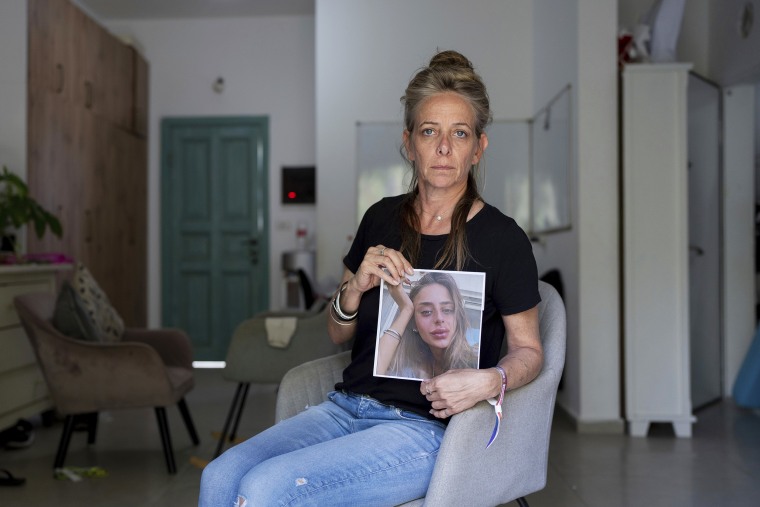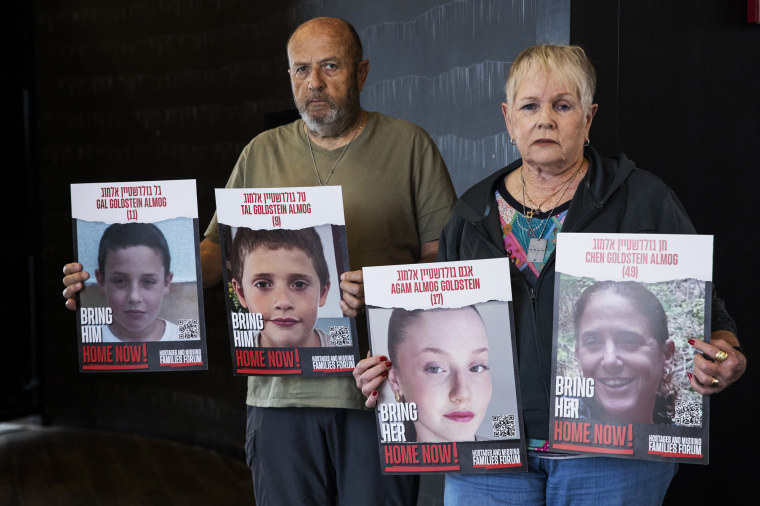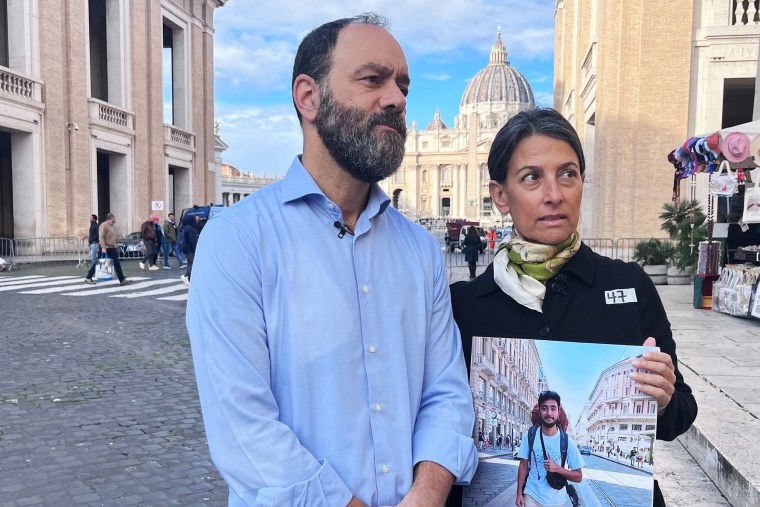TEL AVIV — After weeks of war, the deal between Israel and Hamas has offered a burst of hope but also a new bout of agonizing waiting for the families of hostages held in Gaza.
The names of the 50 hostages to be released during the four-day pause in fighting have not been made public, leaving their families in limbo — hoping their loved ones might be among them, and wondering if and when they might be reunited.
Keren Schem said she has been shaking since the moment she woke up and heard of the deal.
Her daughter, Mia, was taken hostage by Hamas at a music festival in southern Israel during the terror attack on Oct. 7. She knew nothing about what happened to Mia until 10 days later, when Hamas released a video in which her daughter, 21, appeared on camera.
Speaking with NBC News at her home in the Tel Aviv suburb of Shahom, Schem said she had no idea if Mia would be among the 50 hostages that are expected to be released imminently.
“It’s like a Russian roulette — we’re waiting to see who will come back home,” she said. “It’s crazy. We don’t have names yet. Only speculations that it is going to be mothers and their children. And it’s tough, very tough.”
She said she got a phone call from Israeli authorities to tell her about the deal, but nothing beyond that.

The agreement brought some relief and came sooner than she expected, Schem said, but she remains cautious because “everything is so delicate” and could change at the last minute.
Asked if she was allowing herself to think about what she might say to her daughter the first time she sees her, Schem did not hesitate.
“I don’t think I will speak,” she said. “I will just hold her and hug her and I won’t ask questions — that’s for sure. I just want to hold her.”
The Hostages and Missing Persons Families Forum, which represents the families of the hostages and those who have gone missing since the Hamas massacre, said in a statement that it was “very happy that a partial release is pending,” but there was no clarity about exactly who will be released and when.
The agreement, brokered by Qatar, Egypt and the United States, was announced early Wednesday, and will involve a four-day pause in fighting, the delivery of more aid to Gaza and the release of 150 Palestinian women and children held in Israeli custody. It includes an option to extend the pause in exchange for 10 hostages released per day, an Israeli official said.
But the deal is not final until 24 hours from the time it was announced to allow Israeli victims of alleged Palestinian attackers held in jails to appeal the deal to the country’s supreme court. Their appeal was later rejected by the court.
National security adviser Jake Sullivan told “TODAY” on Wednesday that even though Washington has some information on the identities of those to be released, they won’t be certain until the hostages are physically received. He added that the list was comprised of the women and children currently held hostage, and that three Americans should be a part of that group — two women and a child.
The hostages are expected to be released over a period of four days in a “carefully choreographed” exchange. “So there will be an agonizing wait day by day as families look to see if their hostage, their loved one, is in the particular release that day,” Sullivan said.
A senior Palestinian official said that “the release of a number of our prisoners during the war is a very important thing.”
“This deal can signal a start to a change in the general atmosphere of this war,” Qadura Fares, head of the Palestinian Authority’s Commission for Prisoners Affairs, told Reuters.

The morning after the deal was announced, some of the hostage families gathered at the Vatican for a meeting with Pope Francis. The pontiff also received a delegation of Palestinians with family members in Gaza. The meetings were arranged before the hostage deal was announced.
Rachel Goldberg was among the hostage family members seen by the Pope.
Her 23-year-old son, Hersh, was kidnapped from the Supernova music festival.
Goldberg and her husband, Jon Polin, also did not know if he would be part of the group of 50 hostages who are expected to be released under the deal, but said the news l came as “total relief” and offered hope that more are going to follow.
Polin and Goldberg hoped that even if Hersh was not immediately released, they could learn more, through other hostages, about his condition and what the process has been like for those taken captive.
Families have been left with little information about what has happened to their loved ones, often left to scour videos posted on social media or released by militant groups.
From a video showing his abduction, they know that Hersh’s arm was severed at the elbow.
“We’re just parents praying that our son comes out, you know, hopefully, soon, as soon as possible,” Goldberg said. “And until then, we just have to hope that, you know, he’s getting the treatment that he needs, and that people are being kind to him, and for all the hostages, because they’re really in a vulnerable place, mentally and physically.”
Four hostages have already been released since Oct. 7, with another freed by the Israeli military. Two American women, Judith and Natalie Raanan, were released on Oct. 20, followed by two elderly women, Nurit Cooper and Yocheved Lifshitz, just days later. After her release, Lifshitz said she “went through hell” but offered the public limited details of her time in captivity.
Polin said one of the things they have been working on is liaising with a team of orthopedic specialists who are preparing detailed notes of exactly what medications Hersh should be on and what treatments he should be getting. “We are working to get those details to the ICRC to get in to him, and give him the treatment that he’s so desperately needed,” he said, referring to the International Committee of the Red Cross.
“Although I’d rather give it to him myself,” Goldberg added. “So if they want to have him come out, and I’ll just give him those treatments myself, when he gets home, I’d be very happy to give him whatever he needs.”
Goldberg said that before the Hamas attack Hersh, who was born in California, was about to travel around the world, a trip he had been planning since first grade. He was in Israel to celebrate his birthday.

She said she brought a printed photo from his travels in Italy this summer to the meeting with the pope, who she said shared in their “agony and anguish,” and said that he was going to use any influence that he could to help free all of the hostages. She said she wanted the pope to see her son “happy and healthy in Italy,” and share that he is a “wild soccer fan,” just like the pontiff.
She has been putting a piece of tape on her heart with the number of days that Hersh has been kept hostage. On Wednesday, it was 47. It marks the number of days her heart has been missing, Goldberg said. “I hope to take it off soon and have my heart back where it belongs,” she added. “And have my Hersh back with me where he belongs.”
Keir Simmons reported from Tel Aviv, Anne Thompson from Rome and Yuliya Talmazan from London.






